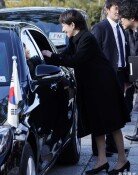[Editorial] Inter-Korean relations need protocols
[Editorial] Inter-Korean relations need protocols
Posted September. 06, 2000 14:50,
The South Korea Red Cross on August 26 proposed that inter-Korean Red Cross talks should take place on September 5. Failure of North Korea to make any reply to the offer is beyond comprehension.
Once the South side made the offer 10 days prior to the proposed date it is quite reasonable and proper for the North to give a reply to whatever effect on whether it will accept the overture or see fit to put it off to another date.
Pyongyang, however, kept mum until the proposed date arrived. Its liaison officer at Panmunjom, when asked what was the matter, kept mentioning the absence of an instruction from the higher-ups. The North might well have had their own reason to do so.
If the two Koreas are to carry out a number of projects ahead, it is most important to cultivate mutual confidence and faith. Some of the recent instances show that North Korea regrettably has ignored the basic rules or procedures for building such confidence and faith. The passive attitude of Seoul, which appeared to be a pushover, also is deplorable. Sometimes, the procedure and form may be more important than the substance.
One such example was the second round of ministerial talks of late. Unification Minister Park Jae-Kyu and the rest of the Southern delegation, went aboard a Pyongyang-bound plane, not informed of the itinerary prepared by their Northern counterparts because the latter did not provide any information in advance. The meetings proceeded at Pyongyang`s pace to easily agree on economic assistance from the South, but on military matters in which Seoul was most interested they barely brought out a vague reference to an accord for future "consultations" or "efforts" even extending the talks one day.
No headway was made regarding the establishment of a permanent venue for family reunions or the repatriation of ROK prisoners of war and abductees from the South now held in the North. This meager progress resulted in part from the obsession of the Seoul government with showy outcomes of inter-Korean dialogue.
The same could be said of food aid, which North Korea asked to be delivered as soon as possible. Few would object to the grain aid that is a dictate of humanitarianism. But too rash provision of food aid is bound to invite criticism that South Korea as being overly open to the demands of North Korea. Although it is time-consuming, the government is supposed to follow due procedures to elicit a national consensus on the quantities and conditions of the food loan by going through deliberations by the National Assembly.
Various events and projects are pending between South and North Korea this month alone. Among them are a proposed meeting of defense ministers, visit of Northern economic missions to Seoul, initiation of Seoul-Shineuiju cross-border rail line and exchange of sightseeing groups to visit Mount Baekdu and Mount Halla-- all of these to follow up the joint declaration made on June 15. Part of them are on the drawing board, and the rest are about to get underway. At this juncture, the authorities of Seoul and Pyongyang are required to abide by relevant procedures and formulae of operation step by step.



![[사설]참 구차한 김병기 전 원내대표](https://dimg.donga.com/c/138/175/90/1/wps/NEWS/IMAGE/2026/01/13/133151454.1.jpg)

![[단독]특검, 보안 유지하려 ‘사형-무기징역’ 논고문 2개 써놨다](https://dimg.donga.com/c/138/175/90/1/wps/NEWS/IMAGE/2026/01/14/133157812.1.jpg)

